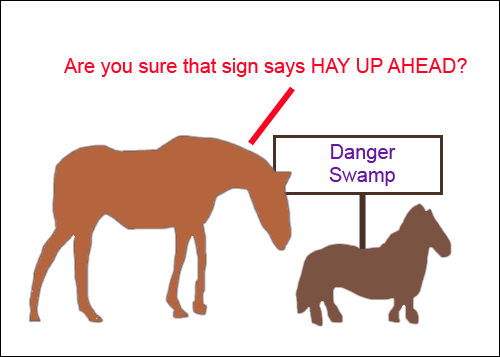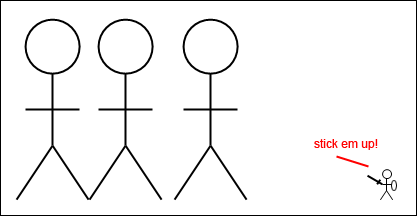Did you know that porpoise means pork fish? The word comes from the Old French porpais, a joining of the two Latin words porcus (pig) and piscis (fish). Latin already had two words for the porpoise - porculus marinus. The Old French folk just booted out the marinus, kept the porculus, and ended up with porpais.
We've all heard of the headless horseman. But a Coach-a-bower was a phantom coach drawn by headless horses, the appearance of which is said to be an omen of death. Yes, headless horses pulling a phantom coach. Is it just me or is that far more scary than a human sans noggin? Anyway, next time you're feeling a little under the weather, keep an eye out for headless horses. It might be the last thing you see.
The Spanish in 1330 had the word flamenca, which meant 'of a ruddy complexion, flesh-coloured'. Later, they looked at the pink bird, looked at the Flemish and Dutch people, thought they were the same colour, and so called the bird flamenco. Our Flamingo is derived from this. So, basically, Flamingo is a racist word!
Penguin
It's Black and White
Penguins aren't penguins! Originally, the name was given to the Great Auk, seen in Newfoundland (1578 is the first use of the word. The Great Auk became extinct in the 19th century). To be fair, the Great Auk did look like a penguin. But it's not related. The name was given to the bird we call a penguin because of the similarity. The Great Auk had been called a penguin for 10 years before actual penguins were discovered. Nobody knows where the name penguin comes from. It's suggested the name is formed from the welsh pen (head, headland) and gwyn (white). But this is hotly disputed. Well, hotly in etymology circles, anyway.
Chameleon
A lion at heart
Chameleon derives from the greek word for ground lion (Chamailéōn). It used to be spelled camelion in English. We got the ch at the beginning in the early 1800s in imitation of the Greek.

COLT-PIXY
18th, 19th century
In Hamshire and Dorset, a Colt Pixy was a sprite or fairy, in the shape of a horse, which
neighs and misleads horses into bogs.

The earliest known animal joke is from Sumeria,
from about 4000 years ago. It's this:
A dog walks into a bar and says, "I can't see a thing.
I'll open this one."
Nobody knows why that killed in Sumeria. I guess you had to be there.

Kangaroo
I don't understand
Actually, the word kangaroo doesn't mean 'I don't understand'.
It's thought that, when Captain Cook landed in Australia, the locals said 'Kangaroo' when one of these creatures was pointed to.
The locals didn't know what the hell these white boys were talking about, so just said Kangaroo (I don't understand).
This is nonsense. There is a language called Guugu Yimithirr.
The local people who spoke this language are the ones that Cook blundered across.
The word the locals used for the grey bouncy animal was gangurru.
The word Armadillo comes from the Spanish. It means 'small armed person'.
It was coined in 1577 when the Spaniards first bumped into them.
Obviously, the Spaniards never bothered to ask the locals what their word was for this small armed person.

Coined by William Tyndale for his bible of 1530. On the Day of Atonement, two goats were brought forward. One goat was to be freed into the wilderness. It wasn't good news for the other one. (The words 'throat' and 'slit' spring to mind.) It was all meant to symbolize the sins of the people being released.
Except, Tyndale got it wrong. He thought the Hebrew word `azāzēl was two words `ēz ōzēl. So he scribbled down the meaning of `ēz ōzēl, which was 'goat that departs'. The Hebrew word `azāzēl, however, is actually a proper name, thought to be the name of a place (nobody's sure where). It was also said to be the name of a demon. Nothing to do with goats at all! Still, a least we got the word scapegoat out of it (escaped goat).
Werewolves
Full moon animals
The man who wrote the first werewolf novel also wrote the hymn "Onward Christian Soldiers". That man was Sabine Baring-Gould. And he spelled it 'were-wolves', with a hyphen. Here's a quote from the book, just to whet your appetite:
"... it's a fiend, a worse than fiend, a man-fiend, -- a worse than a man-fiend, a man-wolf-fiend."
There's the blurb for the next movie version: Is it a fiend? Is it a man-fiend? No, - it's a man-wolf-fiend!
Onward Christian Soldiers, and look out for that were-wolf.




